Lunchtime Capers is a series chronicling my hour-long lunch break and the places I venture to – a store, markets, a roadside restaurant. Home.
—–00000—–
This lunchtime caper is from months ago, when my friend, Osemhen and I visited a market close to our office. She wanted to learn to make a soup I had heard about but didn’t know how to make and I suggested we go to the market to learn.
Read all about Ofe Nsala, love and ogiri in her post.
In Europe or The States, you might ask your butcher the best way to cook a leg of lamb; in Nigeria you would ask a market woman how to cook a pot of soup – they are repositories of everything from recipes to techniques, and more.
So it was that we spent a glorious lunchtime wandering, shopping and getting to know the women. And learning to cook Ofe Nsala, ‘White Soup’, the specialty of Eastern Nigeria and the preserve of the Igbo people particularly in the kitchens of Anambra State.
Now I’ve cooked it, it strikes me as being similar in a sense to not just pepper soup but Ukodo, the pottage version which features yams and plantains.
But first there was a trip to the market to buy the ingredients for this soup which is an accompaniment to steaming mounds of Pounded Yam at the annual ‘New Yam Festival’ – Iwa ji, Iri ji or Ike ji (literally “new-yam eating“) in the east of Nigeria. The New Yam festival is celebrated at the end of the rainy season in August.
On the eve of the festival, old yams are thrown away – tantamount to ‘old things are passed away, behold all things have become new’. The elders bless the new yams and celebration commences – on the plate, and around the village – from folk dances, to masquerade displays, processions and parades.
And with good reasons is there so much celebration. I mean, did you know that Nigeria is the world’s largest producer of Yams? Accounting for over 70% of the total production. Ghana, Côte d’Ivoire, Togo and Benin Republic account for another 24% leaving 6% to the rest of the world.
The trip to the market introduced me to Ogiri, that rich, pungent mixture of fermented seeds. And Uziza seeds aka piper guineese, which I’ve flirted with once before, these tailed peppercorns.
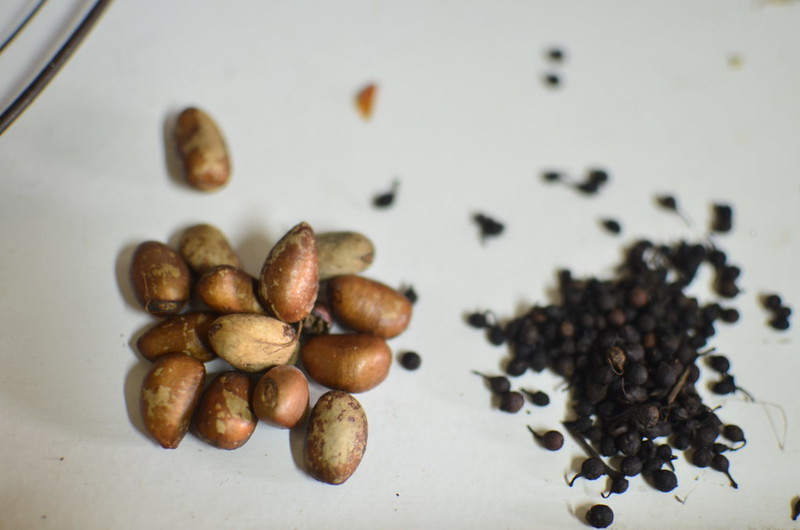
This is a thick soup, without the classic palm oil base common in most other Nigerian soups.
The ogiri lends it deep savouriness and more. So that after cooking, I would need a shower to chase away sweet and pungent. But then, that moment, I didn’t know there was a name for it – the cleansing of co-mingled and diverse scents, like savoury and sweet and petrol fumes till I read A Love Letter to Confident Men. That read is a whole other story which I won’t go into now for we’d be here ALL day.
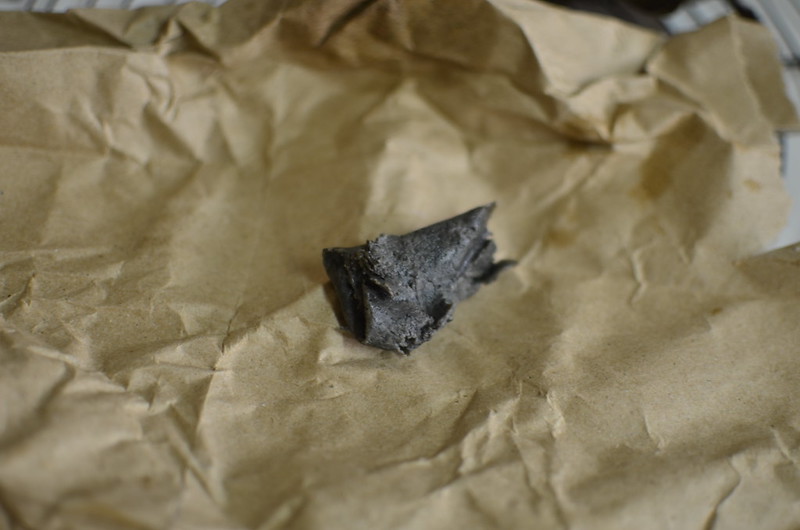
So, Silkwood Shower. That was exactly what I had. A cleansing. Of Ofe Nsala. Cake and diesel on that Sunday evening.
A Silkwood shower is a very long, hot shower taken to disinfect and decontaminate oneself from environmentally acquired smells such as smoke or food.
Before the silkwood shower though, there was peeling, boiling and pounding of cocoyam. As can be expected, I tried two versions – one with raw cocoyam blended and the other cooked to see if there were any textural differences. Unfortunately, the test didn’t succeed as there was far too much liquid in the pot with the ‘raw’ blend of cocoyam. Moving on…
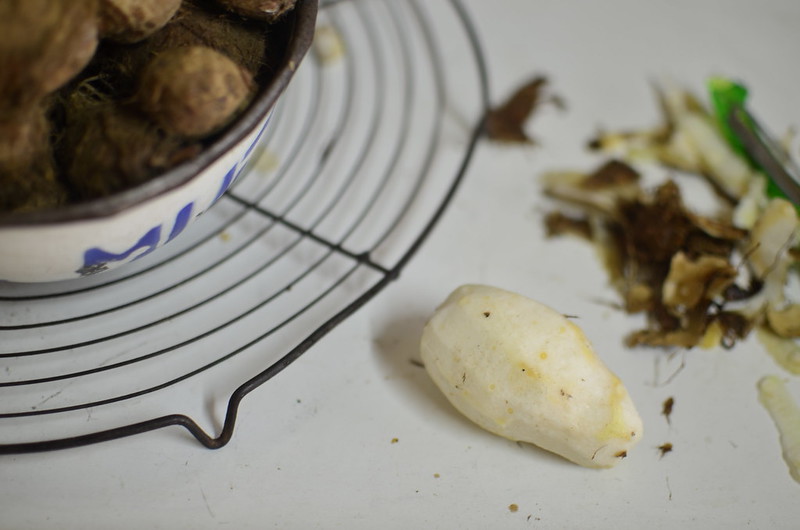
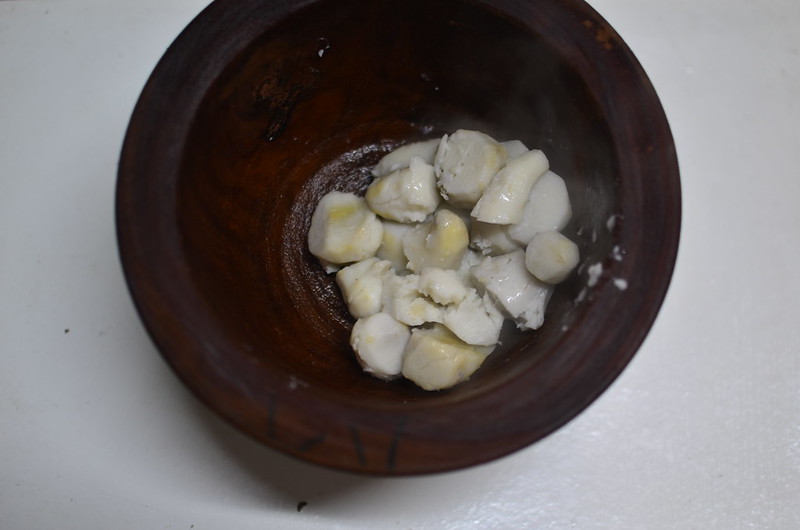
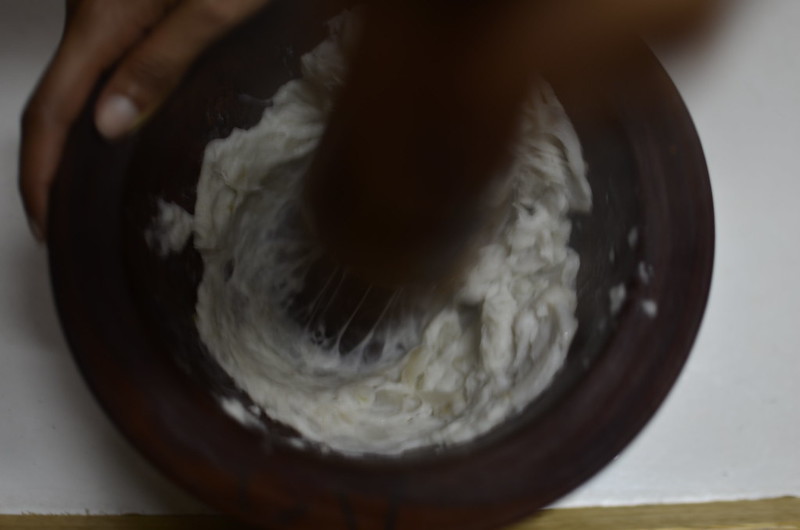
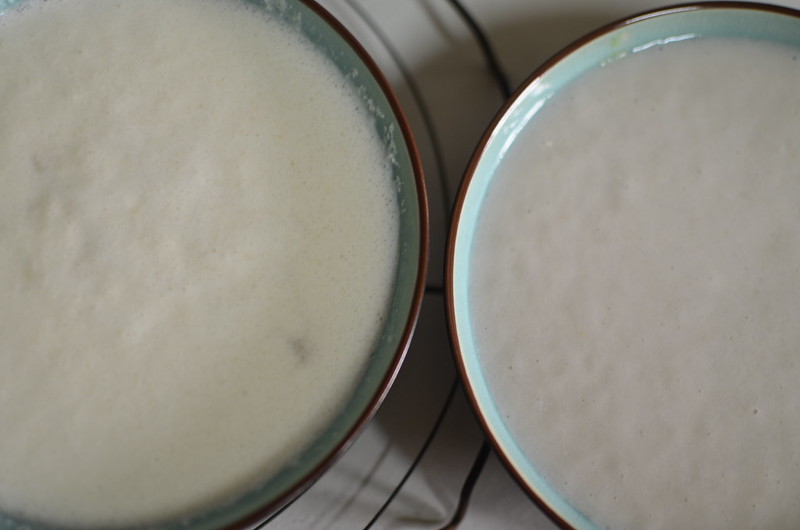
It was quite easy to assemble once all the ingredients were to hand and the meat and ‘orishi rishi’ (extras) prepped.
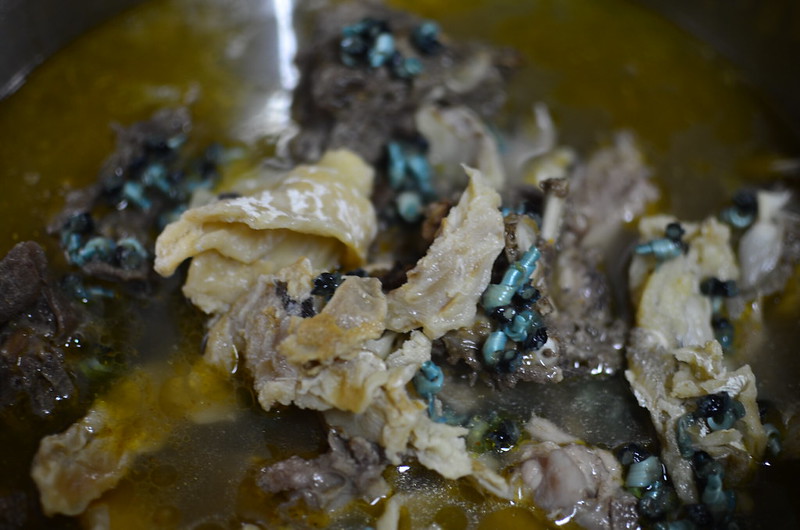
And the cocoyam added.
The end result isn’t exactly ‘white’. More grey than white. But I understand. The reference to the whiteness of the soup is one to the absence of palm oil. We’re all good.
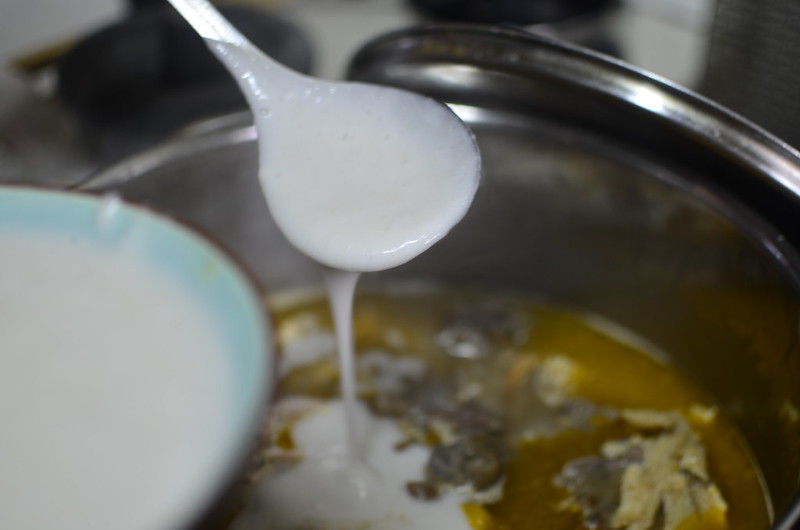
There’s some oil though, but that comes from within, of the chicken and beef.
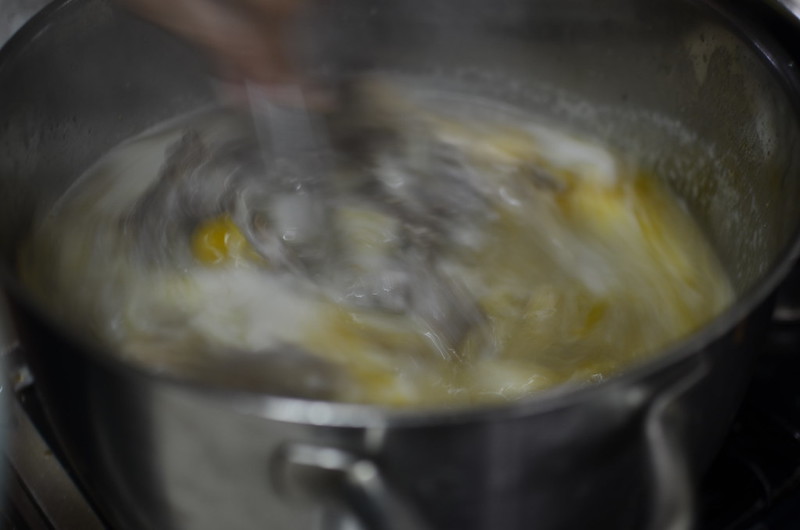
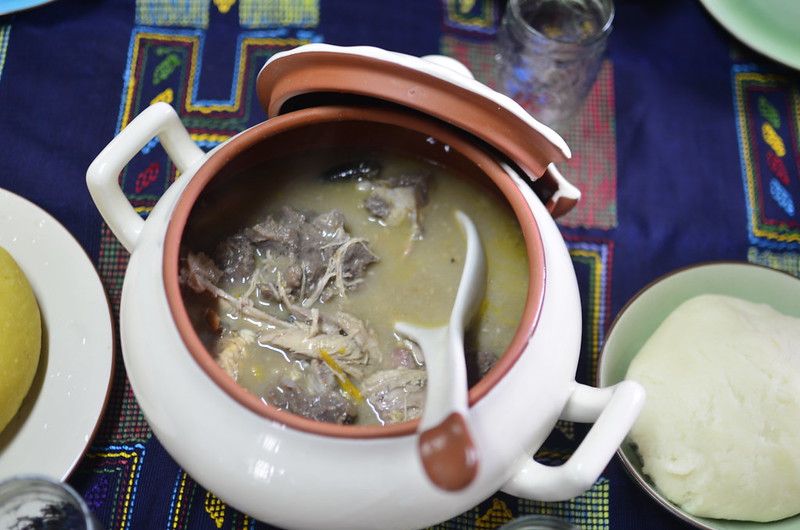
Our chicken, too soft from cooking shredded…but still it was delish.
We portioned out Eba,
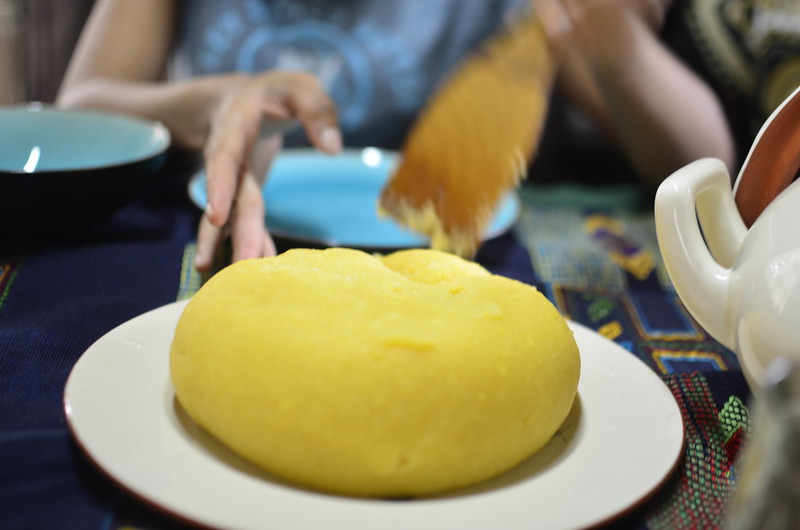
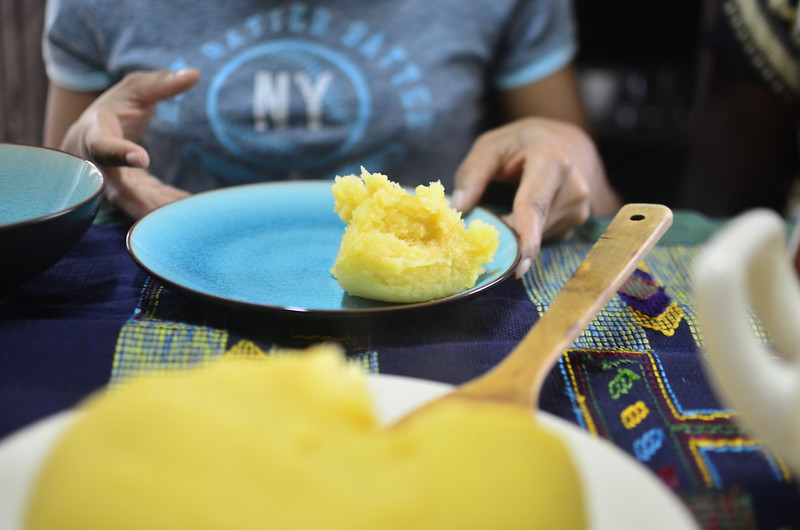
Poundo yam and a side of soup. And tucked in.
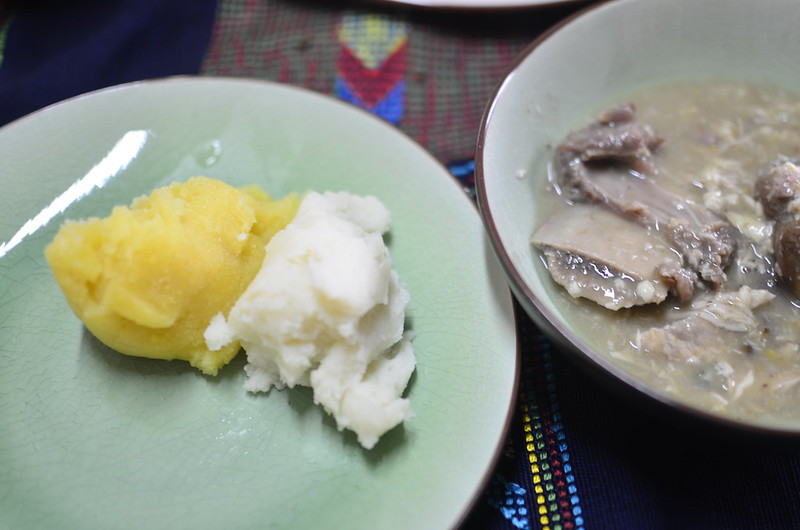
- 3 - 4 cups meat: chicken, beef etc, quantity and variety to personal preference
- 6 - 7 cups of meat stock, reserved from cooking meat
- 3 - 4 cups cocoyam, peeled, boiled and pounded to paste
- 1 cup periwinkles
- 1/2 cup stock fish (cooked)
- 1/2 cup dried red prawns
- 1 tablespoon ground Ehuru, calabash nutmeg
- 1 teaspoon ground uziza seeds
- 2 teaspoons fresh ogiri (fermented cottonseed beans)
- Salt, to taste
- Dried red chili pepper, to taste
- Ground crayfish, to taste
- In a large pot, cook your meat, taking care to stop cooking about half way in as
- To the pot, add the stockfish, red prawns, periwinkles and stir
- Season with ground ehuru and uziza. Check for salt and let simmer for 5 - 10 minutes
- Add cocoyam, stirring well till mix and stock become soup
- Don't put a lid on the pot but leave open and simmer
- Adjust seasoning and take off the heat when meat texture is to your taste
- Enjoy with 'poundo' yam, Eba and zobo. Even if it's not August and the yam comes from flour in a bag.
- I like to season mine with sliced onions, ground crayfish, dry pepper. I always cook my stockfish separately and discard the cooking water as it is quite pungent
- Different varieties of cocoyam have different thickening strengths. If the cocoyam isn't sufficient to thicken the soup - make a mix of yam flour and water and use that to thicken.
Not bad for a lesson taught at a wooden table hewn from rough planks, with the hands of an old lady, brown and lined with knowledge and wisdom from cooking many a pot of deliciousness.


Leave a Reply